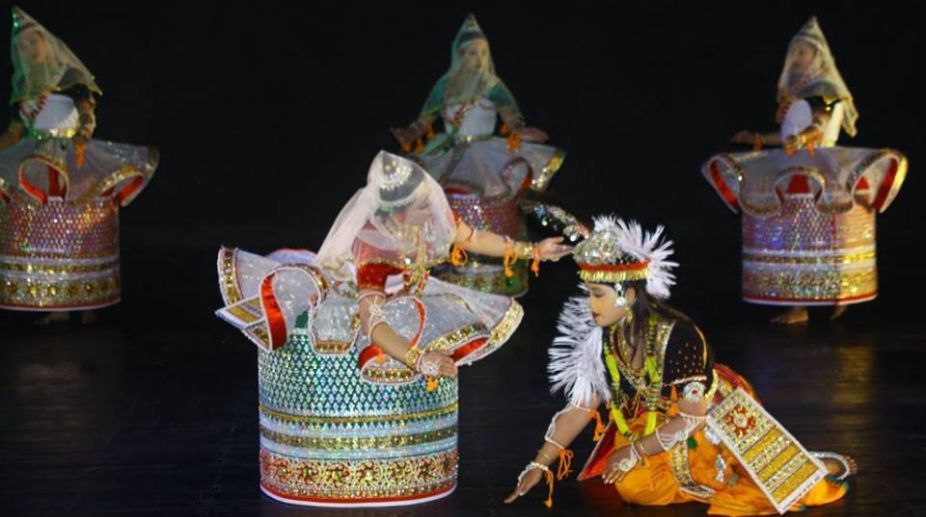Who can forget the mesmerising magic of Manipuri dance presentations by the world-renowned Jhaveri sisters, pioneers in popularising the dance form globally? Ranjana Jhaveri, the second of the four Jhaveri sisters, who epitomised gentle grace and electrifying elegance, passed away recently. Soft-spoken, self-effacing and down to earth, Ranjana would be ready to sacrifice anything for dance. Her demise is a great loss to the world of Indian classical dance.
Born and brought up in a Gujarati family, her parents facilitated every opportunity for the sisters to learn music and dance and get interested in literature and painting et al. Her home was visited by great dancers like Rukmini Devi, musicians like Pt Omkar Nath Thakur, painters like Hebber, Ara, Almelkar, poets like Rajendra Shah, Niranjan Bhagat, Umashankar Joshi and so on. Great dancers like Kamladevi Chattopadhyay, G Venkatachalam, Moti Chandra, Soli Batliwala and J J Bhabha were all very close to the family. As a result Ranjana was very fond of music, dance and Gujarati literature. Her language was very flowery, descriptive and scattered with Sanskrit words for similes. Her writings and articles had a distinct spiritual approach.
Since 1943, Ranjana along with her elder sister Nayana, took part in dance dramas produced by the Bharatiya Vidya Bhavan and Indian National Theatre in Mumbai, where their dance teacher Guru Bipin Singh directed the dance segment. The two younger sisters Suvarna and Darshana emulated their siblings and started learning Manipuri dance under the same Guru at home. Gradually all four of them started performing together to choreographies by their mentor Guru Bipin Singh, where he would always give the part of Radha to Ranjana.
It was not easy to establish themselves as authentic performers of the dance style in Manipur. Ranjana took keen interest in studying Shastras, the treatise, and also learnt playing the drum. She first went to Manipur in 1949 with Nayana and later all four sisters went in 1956 and performed before the three main Raas gurus and received their blessings. Watching the night-long performances of Raas and Sankirtan in the temple courtyards, she was touched by the dedication and devotion of Gurus and artistes for lord Krishna and to their art and the way dance and music are interwoven in the fabric of their devotional lives. Inspired by all this and fascinated with the natural beauty of the land, the four sisters devoted their lives completely to the preservation, perpetuation and propagation of Manipuri dance. During 1960s and 70s, Ranjana travelled all over India and abroad with her sisters privately and as part of government cultural delegations.
Ranjana had mastery over the lasya aspects of Manipuri dance. Her roles as Nayikas, or heroines, especially the Khandita, Abhisarika, Utkanthita and in Krishna roop varnan, won her critical acclaim. She had total command over Kankan, Anangakshep and Radha Nartan, enacting Radha's role in dance dramas like Man Bhanjan, Gopi Gostho, Purvarag, Kaitav-milan, Vasant Raas, Maha Raas, Duet items like Pontha jagoi, Jugal-nartan, Prabandha-nartan and group dance of Khubak Ishei and Mandila-nartan, all composed and choreographed by Guru Bipin Singh. She always assisted her Guru in his valuable research work and helped in listing hours of recording of oral traditions, audio, video of dance compositions.
She was an adorable human being, loving, caring, kind and compassionate at heart. I still remember her warm hospitality when she had invited us to her Juhu residence. It was a revelation to know that she was an excellent cook as well, enthusiastic at that, to prepare new rare dishes that she loved to send to neighbours, relatives and friends. She would hold get-togethers for friends visiting Mumbai and prepare sumptuous food because she enjoyed feeding people. It was a delight to meet her supportive and encouraging husband Bhaskar Lakhani, who helped manage her social and family life along with her busy dance career. Bhaskarbhai took constant interest in her dance activities throughout their married life of 62 years.
One can only hope her younger sister, the SNA Awardee Vidushi Darshana Jhaveri, and her able disciples keep up the tradition Ranjana preserved and propagated with such dedication.











